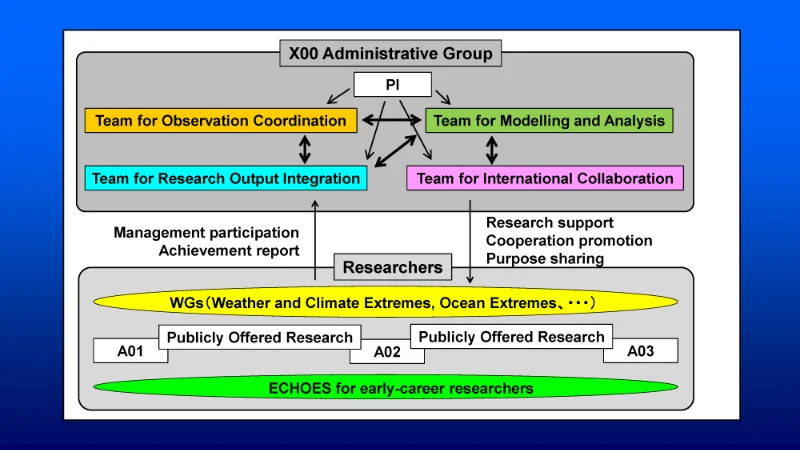X00 Supervision and promotion of Habitable Japan
X00 Administrative Group
Principal Investigator
| OKA Eitarou | U. Tokyo, PI of Research Area, Co-I of A02-4 |
Co-Investigators
| SUGIMOTO Shusaku | Tohoku U., PI of A01-1 |
| HONDA Meiji | Niigata U., PI of A01-2 |
| KOSAKA Yu | U. Tokyo, PI of A01-3 |
| TOYAMA Katsuya | Meteorological Research Institute, PI of A02-4 |
| IWAMOTO Yoko | Hiroshima U., PI of A02-5 |
| ENOMOTO Takeshi | Kyoto U., PI of A02-6 |
| USUI Norihisa | Meteorological Research Institute, PI of A03-7 |
| SATO Tomonori | Hokkaido U., PI of A03-8 |
| TOKINAGA Hiroki | Kyushu U., PI of A03-9 |
| NISHIKAWA Hatsumi | Hokkaido U., Leader of Team for Observation Coordination, Co-Leader of ECHOES, Co-I of A01-2 |
| MOCHIZUKI Takashi | Kyushu U., Leader of Team for Modelling and Analysis, Co-I of A03-9 |
| AIKI Hidenori | Nagoya U., Leader of Team for Research Output Integration, Co-I of A02-5 |
| NONAKA Masami | JAMSTEC, Leader of Team for International Collaboration, Co-I of A01-3 |
Postdoctoral Researcher
Research Collaborators
| KIDO Shoichiro | JAMSTEC, Co-Leader of ECHOES, Co-I of A01-1 |
| HASHIHAMA Fuminori | U. Tokyo, Co-I of A02-4 |
| OBAYASHI Yumiko | Ehime U., Co-I of A02-5 |
| HAYASHIDA Hakase | JAMSTEC, Co-Leader of ECHOES, Co-I of A02-6 |
| KODAMA Taketoshi | U. Tokyo, Co-I of A03-7 |
| SUGIMOTO Shiori | JAMSTEC, Co-I of A03-8 |
| OKAJIMA Satoru | U. Tsukuba, Co-Leader of ECHOES, Co-I of A01-3 |
| HIRATA Hidetaka | Rissho U., Leader of Working Group for Weather and Climate Extremes, Co-I of A01-2 |
| YAMAGUCHI Ryohei | JAMSTEC, Leader of Working Group for Ocean Extremes, Co-I of A01-1 |
| YAMAZAKI Akira | JAMSTEC, Co-I of A03-8 |
In order that Planned Research and Publicly Offered Research together accomplish the whole Research Area’ purpose to address the question “Will mild climate and abundant water/fisheries resources persist as a basis of survival for those of us living in Japan in the future?”, the Administrative Group aims to
- set the environment in which each individual researcher can pursue his/her research freely while sharing the above purpose and cooperating organically
- foster early and mid-career researchers who will play a central role in the next era.
In the Administrative Group, we set up Team for Observation Coordination, Team for Modelling and Analysis, and Team for International Collaboration for research activity promotion, as well as Team for Research Output Integration for output collection. Outside the Administrative Group, we also set up working groups (WGs) for particular themes and the early-career researcher association, named ECHOES (Early-Career HOtspottErS) to promote research cooperation across the Research Area.

Specific activities are as follows.
Sharing of purpose, progress, and achievement over the Research Area
We will regularly hold Research Area meetings and extended Administrative Group meetings to share the purpose and achievement of the whole Research Area and individual Planned Research/Publicly Offered Research projects, as well as to plan inter-project meetings and WG meetings. We will also build the Habitable Japan website to share the purpose and results within the Research Area and advertise them to inside and outside of Japan.
Support of research activities inside the Research Area and promotion of research cooperation with inside and outside of the Research Area
(1) In in-situ observations such as shipboard observations in the Japan Sea, the Pacific off Tohoku, and the East China Sea southwest of Kyushu, Team for Observation Coordination will coordinate the cooperation system in and beyond the Research Area, to steadily implement each observation while effectively using human/material resources within the Research Area, as well as to collect the obtained data. (2) Team for Modelling and Analysis will promote high-resolution modelling studies within the Research Area, and build cooperative relationship with other domestic/international projects on global warming togheter with Team for International Collaboration, thereby providing access to enormous data with the Habitable Japan members. (3) To enhance international research collaboration, Team for International Collaboration will encourage short-term visits of early/middle-career researchers to overseas research institution, and hold international workshops with invited top researchers from abroad. (4) Team for Research Output Integration will take the lead in summarizing various research outputs from the Research Area and sharing them within the Research Area toward the common goal. (5) To promote cooperative research across disciplines, we will set up WGs for important themes and support their activities. We first establish WG for Weather and Climate Extremes and WG for Ocean Extremes, and will add and reorganize WGs as needed. (6) To maintain the cooperative relationship with the Japan Meteorological Agency established during Hotspot 2 project and reflect our results in operation, we will continue holding joint research meetings.
Achievement advertisement to inside and outside of Japan
With the support of Team for Research Output Integration and Team for International Collaboration, toward research communities, we will promote session proposals by early/middle-career researchers at domestic and abroad meetings and planning of special issues of academic journals. Toward general public, we will promote achievement advertisement through the Research Area website, press releases, and the open symposium planned in the final year.
Fostering of early-career researchers
To strongly connect graduate/undergraduate students and postdoctoral researchers with researchers in their 30s that are expected to be role models, we will support the early-career researcher association, named ECHOES, and their voluntary activities such as cross-disciplinary seminars and summer schools. We will honor best poster presentations by early-career researchers at the Research Area meeting, encouraging their further development. To broaden early-career researchers’ perspectives, we will encourage their participation in international cooperative activities and shipboard observations. WGs, such as WG for Weather and Climate Extremes and WG for Ocean Extremes, are also expected to be led by early-career researchers.
